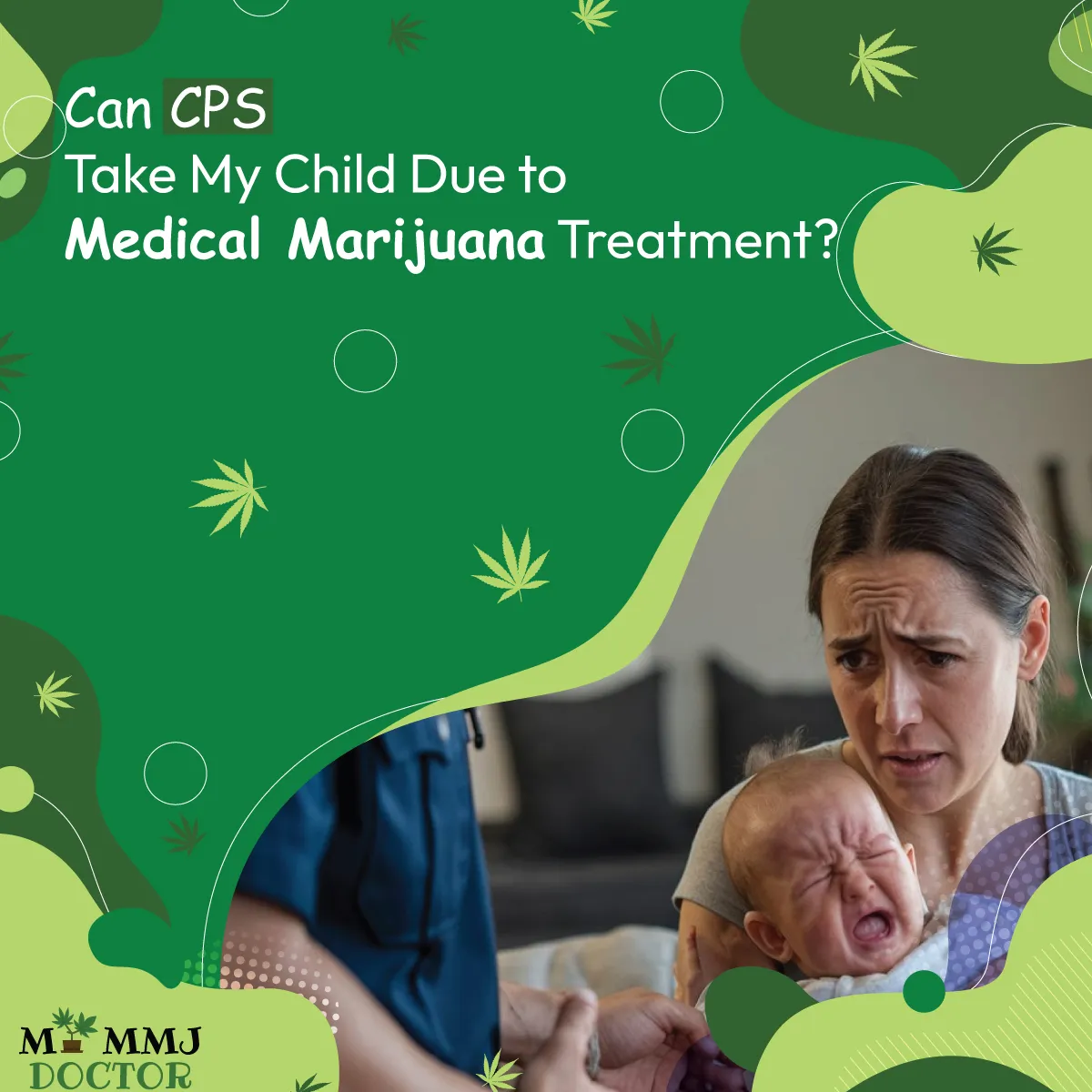
This blog is here to set your mind at ease while providing practical and user-friendly guidance. Whether you’re new to medical marijuana or simply navigating its legal complexities, we aim to help you understand your rights, address your concerns, and protect your family. Let’s dive into this sensitive topic together with clarity and support.
Key Points:
- CPS and Medical Marijuana: CPS investigates situations where a child’s safety might be at risk, including concerns about substance use. Using medical marijuana legally and responsibly does not automatically lead to CPS involvement.
- Potential Risks: CPS may intervene if medical marijuana use causes impaired caregiving, unsafe storage of products, or if there’s no proper legal documentation.
- Protect Yourself: Always stay compliant with state laws, securely store marijuana products, avoid using cannabis in ways that affect caregiving, and maintain a safe home environment.
- Your Rights and Support: Understand your rights as a parent, keep proper medical documentation, and seek legal help if needed to ensure your family stays protected.
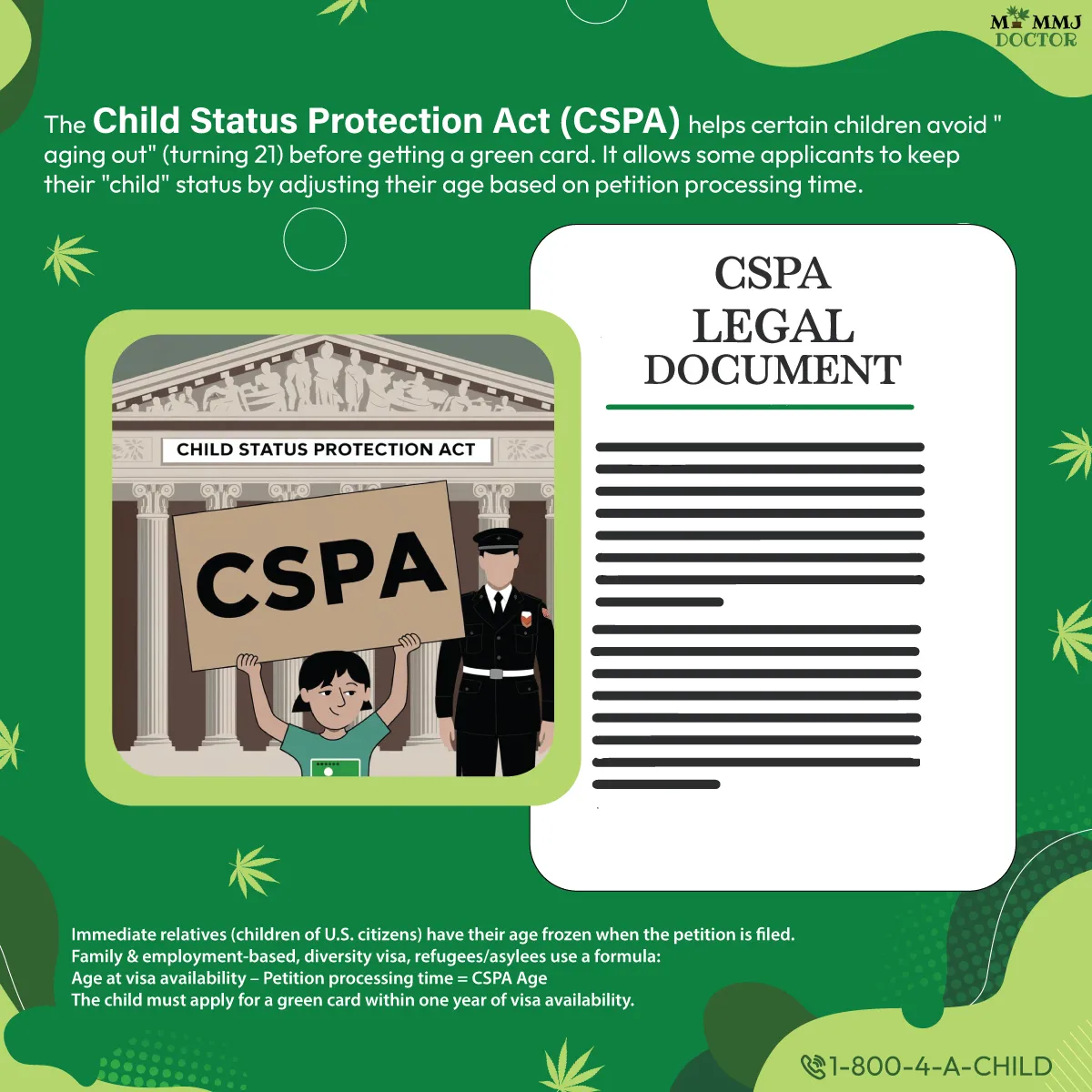
What is CPS?
How does CPS Operate?
CPS Responsibilities:
- Ensuring children live in a safe and nurturing environment.
- Investigating reports of neglect, abuse, or endangerment.
- Providing support and resources to families to address safety concerns.
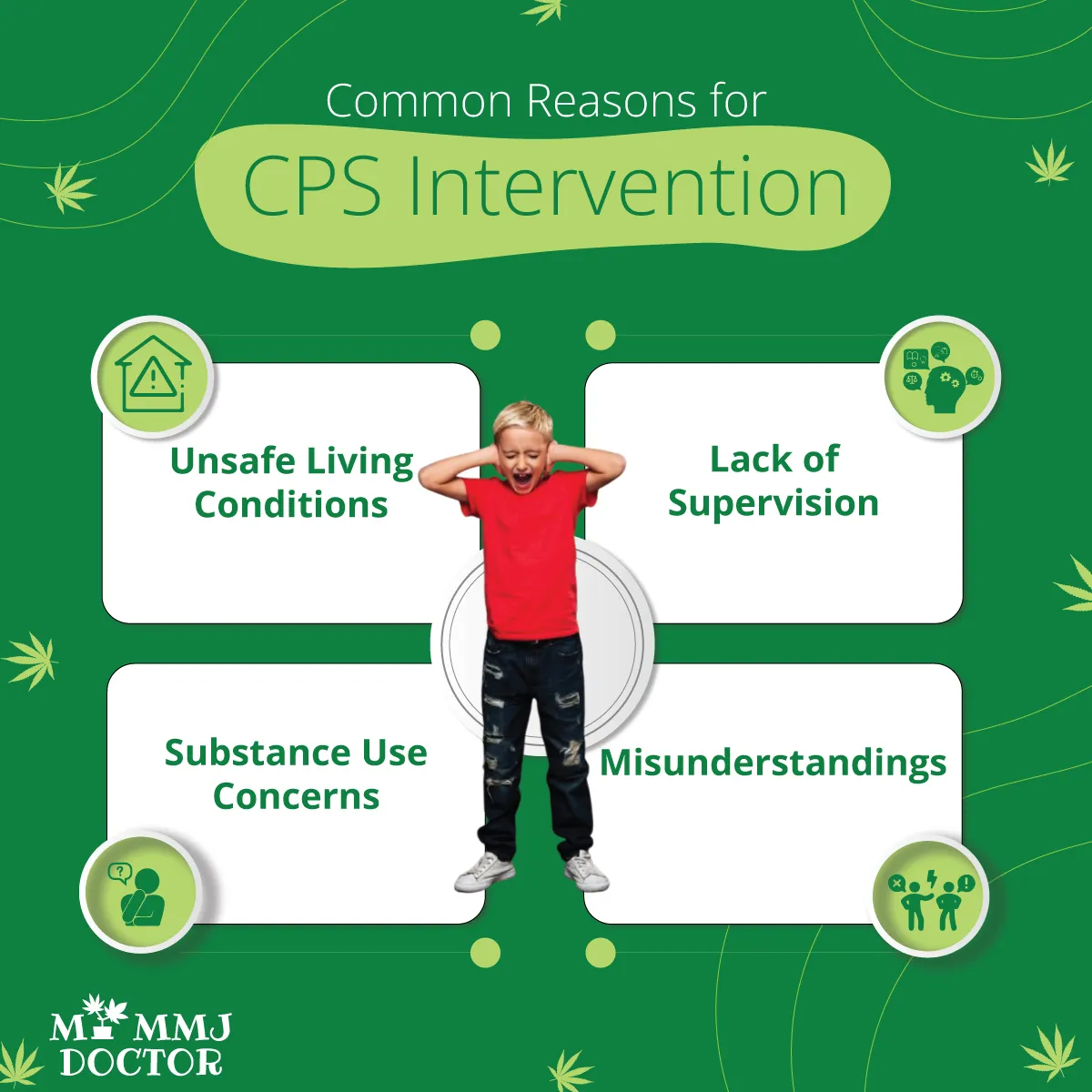
Common Triggers for CPS Involvement:
- Unsafe Living Conditions: Reports of hazards or neglect in the home.
- Lack of Supervision: Situations where children are left unattended or inadequately supervised.
- Substance Use Concerns: Instances where substance use, including medical marijuana, raises questions about caregiving ability.
- Misunderstandings: False reports or misinterpretations of family situations.
For parents, the idea of a CPS investigation can feel overwhelming. While CPS’s ultimate goal is to ensure a child’s safety, it’s essential to understand their process, your rights, and how to navigate such situations with confidence.
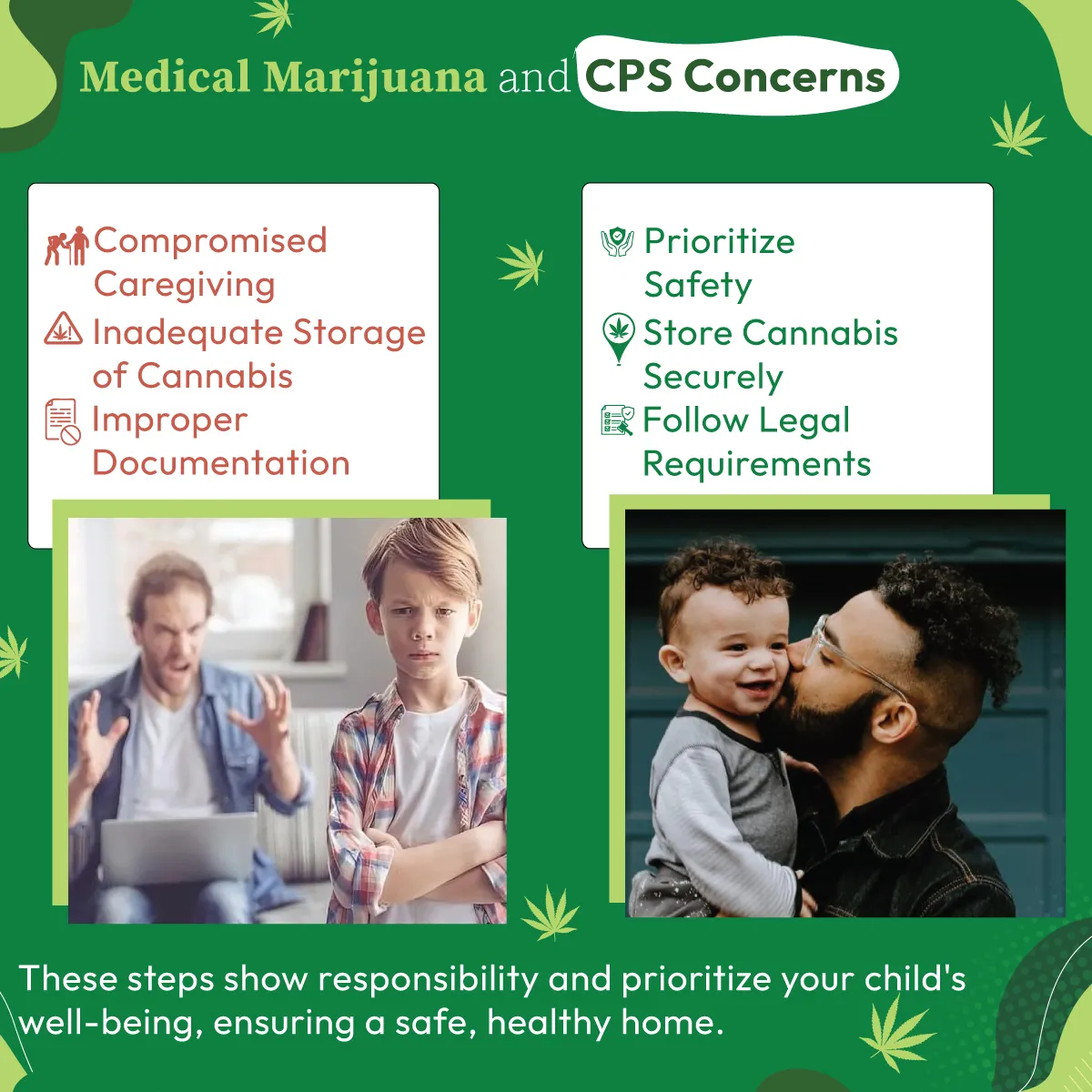
Medical Marijuana and CPS Concerns:
Using medical marijuana responsibly is crucial for parents, especially when CPS is involved. While medical marijuana is legal in many states, certain situations can still raise concerns. Here’s what you need to know:
Potential Red Flags:
- Impaired Caregiving: If cannabis use affects your ability to care for your child, it could raise serious concerns. CPS may question whether you’re able to meet your child’s daily needs or not.
- Unsafe Storage of Marijuana Products: Keeping cannabis products in places accessible to children can lead to safety risks. Always store these items securely and out of reach.
- Lack of Proper Documentation: If you’re using medical marijuana without the necessary prescriptions or legal documentation, it might suggest non-compliance with laws, which can be a red flag or invitation for CPS.
Responsible Use:
To avoid complications and ensure your child’s safety, follow these practices:
- Maintain Safety at All Times: Ensure your caregiving abilities are not compromised by cannabis use. Prioritize your child’s needs first.
- Secure Your Products: Store all marijuana products in a locked or inaccessible area to keep them out of children’s reach.
- Stay Compliant: Always have proper medical documentation and adhere to your state’s legal requirements for marijuana use.
- Demonstrate a Safe Environment: Show that your home is a safe, supportive place for your child to thrive.
By taking these steps, you can demonstrate responsible behavior and reassure CPS that your child’s well-being is your top priority. Remember, the goal is to create a safe and healthy environment where your family can live and flourish.

Your Rights as a Parent While Using Medical Marijuana:
As a parent using medical marijuana, it’s crucial to understand your rights and how the state law protects you. Knowing these rights can make a big difference if you ever face inspection from CPS.
Legal Protections:
- Many states have laws in place that protect medical marijuana users from discrimination, including within parenting contexts.
- If you are using marijuana legally, with a valid prescription from a licensed healthcare provider, these protections often extend to you.
- Understanding your state’s specific marijuana laws is key. Familiarize yourself with your rights and the potential risks involved.
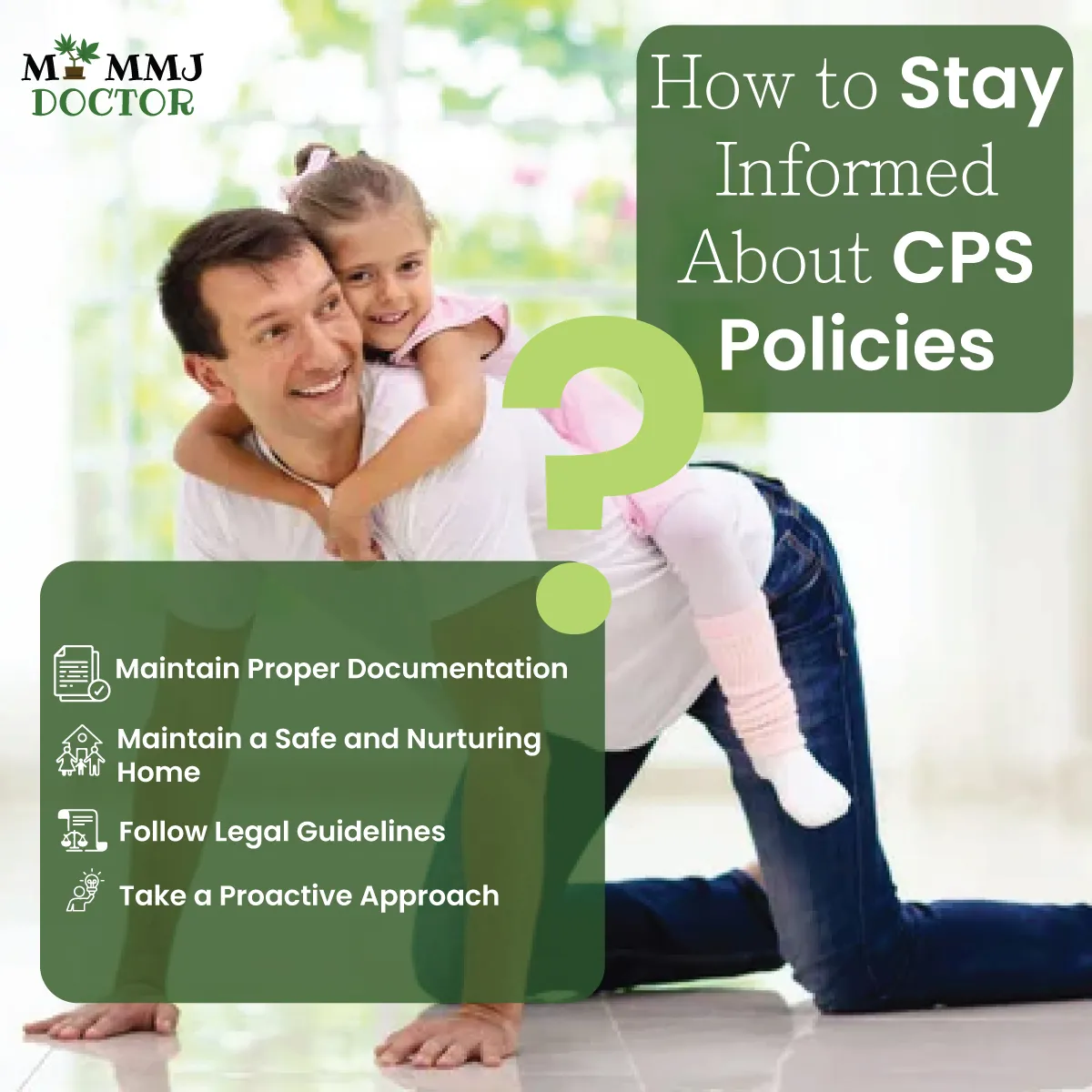
How can I be up to date with CPS?
When dealing with CPS or any legal inspection, here are some actionable steps to protect your rights and demonstrate your commitment to your child’s well-being:
- Present Documentation: Always have up-to-date documentation from a licensed healthcare provider. This validates your medical marijuana use and shows that it’s part of a legitimate treatment plan.
- Show Evidence of a Safe Environment: Highlight that your home is a safe and nurturing place for your child. Keep medical marijuana products securely stored and demonstrate that your usage does not interfere with your caregiving responsibilities.
- Prove Compliance: Be prepared to show that you are fully compliant with your state’s regulations for medical marijuana use. This includes having the necessary prescriptions, staying within legal limits, and avoiding any illegal substances.
- Be Proactive: If you sense potential concerns, consult with a family law attorney familiar with medical marijuana cases. They can provide guidance and help you advocate for your rights effectively.
By being informed and proactive, you can protect yourself and your family while ensuring CPS sees you as a responsible and loving parent. Remember, advocating for yourself isn’t just about defending your choices; it’s about proving your dedication to your child’s well-being.
Conclusion
Taking these steps will help you make sure you’re protecting both your health and your family’s well-being while using medical marijuana responsibly.
FAQs
- What Happens if a parent fails a drug test?
If a parent fails a drug test, CPS may investigate to ensure the child’s safety and well-being. The outcome depends on the circumstances. If the failed test indicates substance misuse that impacts caregiving abilities or creates an unsafe environment, CPS might require parenting classes, counseling, or other interventions. In severe cases, it could lead to temporary custody changes.However, if the parent is using medical marijuana responsibly with a valid prescription, CPS typically considers this differently. Demonstrating a safe home, secure storage of medication, and no impairment during caregiving can help protect parental rights and minimize potential consequences.
- What is the child drug exposure test?
A child drug exposure test is used to check if a child has been exposed to drugs through ingestion, inhalation, or environmental contact. It’s often requested by CPS or law enforcement in cases of suspected drug use or unsafe home conditions. Common methods include urine, blood, hair, or saliva tests, which detect drug exposure over varying timeframes.Environmental testing may also be done to find drug residues in the child’s surroundings. The goal is to assess the child’s safety and well-being. If exposure is confirmed, it may lead to interventions to protect the child and address the issue.
- Will I lose custody if I fail a drug test?
Failing a drug test doesn’t automatically mean you’ll lose custody, but it can raise concerns about your ability to provide a safe environment for your child. The outcome depends on the circumstances, such as the type of drug, frequency of use, and its impact on caregiving.If the court or CPS finds that drug use compromises your child’s safety or well-being, they may require interventions like parenting classes, counseling, or even temporarily modifying custody arrangements. However, demonstrating responsible behavior, such as having a valid medical marijuana prescription and no impairment while caregiving, can help protect your custody rights.
Related Articles
How to Get a Medical Marijuana Card in Maryland?
How Can You Obtain Your Medical Marijuana Card in Maryland in 2025?Are you a Maryland resident seeking a way to manage your symptoms naturally? You came to the right place. Maryland has a medical marijuana program that allows eligible...
Benefits You Are Missing Without a Michigan MMJ Card
Top Benefits of a Michigan Medical Marijuana CardIf you live in Michigan and already use cannabis, you likely know it’s easy to access. However, many people don’t realize that having a Michigan medical marijuana (MMJ) card offers additional...
What are the Michigan Medical Marijuana Laws?
What are the Michigan Medical Marijuana Laws?Medical marijuana has been legal in Michigan since 2008, helping thousands of residents manage chronic pain, anxiety, cancer symptoms, and more. But knowing what’s allowed - and what’s not - can...






0 Comments